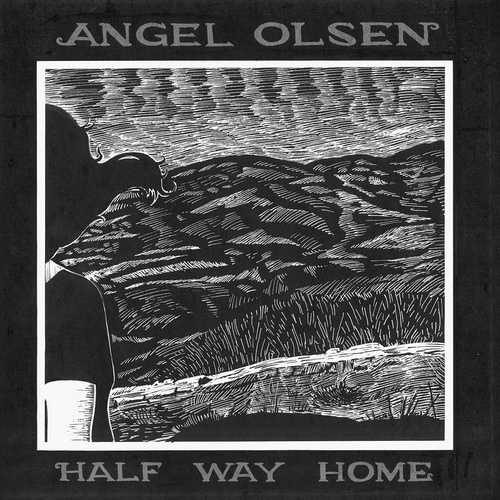Angel Olsen seems to exist in some alternate American history, where the dust bowl winds swept across the entire country and the pains of The Great Depression lingered on. These conjured images of weary travels and brown, broken lands seem to fit Olsen perfectly as she sings about desire and a hesitant redemption on her newest album, Half Way Home. She’s just another country barker at a carnival that stretches across the Midwest, bringing streaked patches of color to sepia-soaked towns. With a voice that rises and falls at the slightest provocation, she conjures barren hills and dust covered travelers intent on reaching some instinctual destination. Rather than overly process the songs on Half Way Home, Olsen allows them to unfold and wrap around the listener. You may hear the bare glimmer of a piano or the ragged distortion roaring from an electric guitar saddled next to a delicate optimism, all held together by Olsen’s deceptively fragile voice. Don’t let her fool you though. There’s fire in that voice.
Olsen knows that simplicity can work wonders. And she understands this better than most, as opening song “Acrobat” has her gently singing over a simply plucked acoustic guitar. But as with most songs here, that’s just scraping the surface of the track. There is a limitless well of emotion that draws you in and is almost uncomfortable in its intimacy. The longing that drips from her voice is palatable. She sings, “Who cares I’m not a moralist/I’m just a lady with some time” and it comes across as both desperate and subtly aggressive. She is in love and will do anything to make that love tangible. She wants “to be that distant thought/some growing meaning in your mind,” though that reciprocal love is as elusive as ever. “The Waiting” introduces a country sway that’s ripped straight from the Loretta Lynn handbook, though Olsen presses it with her own unique stamp by adding ghostly harmonies and her indelible vibrato. When her voice begins to crack and shake, there is an intensity which spills from those fissures and laces the entire song with an acerbic undercurrent, similar to how Loretta Lynn wove simple country ballads but infused them with a willfullness that belied their humble beginnings.
Even though these songs sound simple, they arrive at their destinations, inspired and changed by the journey. As her words break across the guitars, bass, and drums, there is a tangible sensation of movement. As she accompanies this sideshow, leading us along, she is always carefully watching our steps. “Safe in the Womb” conveys a primal sense of security, a knowingness that someone is looking out for us. Its’ hauntingly spare evocation of trust and safety, even while everything around us crumbles, carries the listener towards some indefinable end, with the knowledge that we are never alone.
“Lonely Universe” stands at the center of the record, a towering achievement, breathtaking in its effortlessness. Her voice drifts along, undercut by a snaking guitar line and an encouragement that “if you have imagined your way back/then my dear you’re more than half way there.” Even though Olsen inhabits this bleak and dreary history, she always makes this painted struggle seem worth the effort. Why else would she carry the torch for the rest of us? The connection to early country women feels absolutely tangible here, as she evokes the tear-stained romanticism of Patsy Cline and the righteous fervor of Tammy Wynette in equal measure. The stark revelations on “Miranda” unfold as charcoal lines drawn slowly across a white canvas. When Olsen sings, “Don’t stand too close to me darling/keep your hands where I can see/don’t you know you’re wanted in 50 states/I love you dear but it’s not up to me” without a trace of accusation, only a feeling of mournful regret.
And while the album never stumbles wildly or veers off course, there is a bleakness, even in the midst of some of the more hopeful songs, that may keep some listeners at a distance. We have no qualms about reading about the Great Depression but we feel no need to have lived through it. On “The Sky Opened Up” she warns, “There’s always somebody to lose.” There is desperation in her voice that speaks of close associations to death and the darker sides of life. She feels the need to chronicle all that she sees and much of it hews closer to blood and bone than we’d all care to imagine. But ever the hesitant optimist, “Free” documents her hopeless love for a person equally infatuated with her. And though she may only be able to reach him, whoever he is, “in her mind,” the love feels shared. Shared with that anonymous person, with us, with everyone. It seems a gift of communal affection.
Cormac McCarthy wrote in The Road, “Nobody wants to be here and nobody wants to leave,” which is as honest a statement about this album as I can give you. She may be trying to bring life to those around her, but the darkness feels ever present, a claustrophobic presence pushing ever closer. But there is strength in people that goes unnoticed by most everyone but not by Angel Olsen. On Half Way Home, she calls to those in the darkness, urging them closer to the light. And all she asks in return is that you carry the fire with her.

